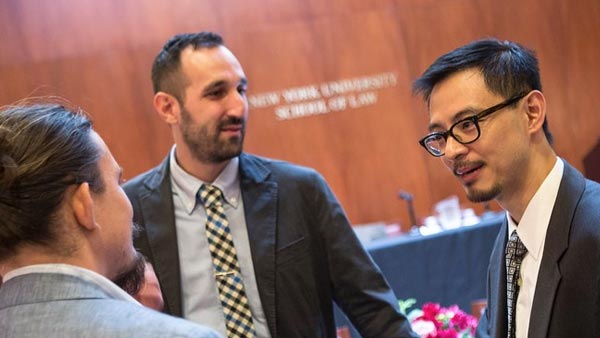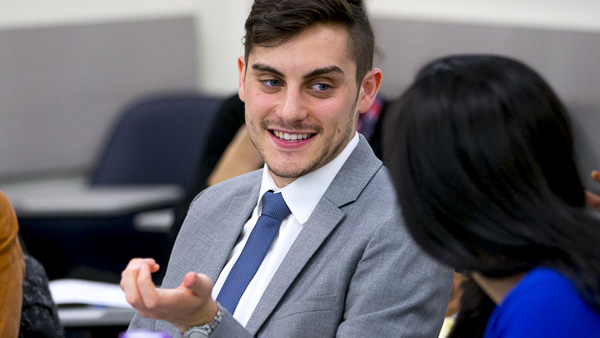
MASTER OF ARTS (MA) IN BIOETHICS
NYU GPH’s Master of Arts in Bioethics stands apart as one of the only bioethics programs grounded equally in philosophy and applied ethics. Our students have a competitive edge with a flexible curriculum that combines our top-ranked bioethics courses with the opportunity to deepen their studies through additional classes in NYU’s top-ranked School of Law and world-renowned Department of Philosophy. The result: A highly customizable and distinguished bioethics program that equips you to analyze biomedical debates, address ethical dilemmas, and lead with integrity into the future.
Why a Master of Arts in Bioethics at NYU GPH?
- Career Launchpad: Alumni from diverse professional backgrounds move on to top PhD programs, medical school, and leadership roles in health care, law, and public policy. With resources like NYU’s PhD bootcamp, guided research opportunities, and a strong alumni network, the program prepares students to tackle the most important issues in bioethics today.
- Faculty on the Frontlines: Learn from renowned faculty shaping tomorrow’s debates, including leaders in biomedical ethics and one professor on the board of Colossal, the biotech firm working to revive the woolly mammoth. This kind of direct connection between university scholarship and real-world innovation is rare.
- Flexible Pathways: Complete the Master of Bioethics in as little as one year, or extend your graduate studies to explore electives, hospital practica in clinical care, or a thesis designed to double as a PhD application writing sample. Students can focus on their specific interests across disciplines, including law, philosophy, medicine, and public policy.
- Lead the Conversation on Emerging Tech: From AI ethics to brain–computer interfaces, our program examines the ethical dilemmas emerging at the intersection of science, medicine, society, and the humanities. You’ll graduate fluent in theory and practice, prepared to shape debates across biomedical and professional disciplines.
- Prestige with Breadth: Housed in NYU’s School of Global Public Health, this education offers unparalleled access to the world’s #1-ranked Department of Philosophy at NYU. Few programs combine the rigor of philosophy, medical humanities, and the applied scope of bioethics in such a comprehensive way.
- Mentorship that Opens Doors: Our faculty, philosophers, ethicists, and practitioners, are deeply invested in student success. On campus, you’ll engage closely with mentors who guide students into top PhD programs, medical schools, and influential professional roles across health care and policy.
Your next step starts here. Whether it’s a PhD, medical school, law school, or advancing in your profession, our Master of Arts in Bioethics program gives you the training, mentorship, and experience to get there.
- PhD Launchpad: Our dedicated PhD Bootcamp provides hands-on mentorship for doctoral applicants, from refining research interests to building a standout writing sample. Many students transform their MA thesis into the core writing sample for their PhD application, a strategy that has helped our graduates secure admission to top programs.
- Pathway to Medical School: With a nearly 100% acceptance rate of our alumni into medical school, our program is one of the strongest springboards for aspiring physicians. Students strengthen their academic profile and set themselves apart in medical school interviews through rigorous training in healthcare ethics and practical experience in clinical settings.
- Preparation for Law School: Bioethics is increasingly central to health law, technology, and policy. Our students leverage their legal coursework and writing to distinguish themselves in law school admissions and build careers at the intersection of law and ethics.
- Advancement for Professionals: Practicing doctors, lawyers, and industry leaders turn to NYU GPH’s master’s degree in bioethics to sharpen their expertise, transition into leadership roles, and gain the ethical lens needed to navigate complex decisions in medicine, policy, and emerging technologies.
Admissions, Faculty, Courses, Practicum, Study Abroad, FAQs
Key Skills
Founded through NYU’s Center for Bioethics, the Master of Arts in Bioethics degree at NYU GPH is one of the first programs in the world to promote a broad conception of bioethics encompassing both medical and environmental ethics. You’ll develop concepts and analytical skills that enable you to think critically about pressing challenges in the broad field of bioethics, and you’ll have the opportunity to focus your studies through flexible curriculum options and the one-on-one guidance from your faculty advisor.
Students will obtain the following competencies upon completion of the Bioethics program:
- Understand the normative philosophical theories that underlie bioethics, clinical practice, research, neuroethics, the ethics of new biotechnologies, the ethics of global public health, and ethics of animals and the environment;
- Grasp key ethical issues and questions that arise in bioethics, clinical practice, research, neuroethics, the ethics of new biotechnologies, the ethics of global public health, and ethics of animals and the environment;
- Analyze and put forward original ideas and arguments that engage with scholarly work and public policy in bioethics;
- Understand how ethical issues are addressed in practical, medical and environmental settings.
In addition, students will be able to:
- Identify the background literature for a particular bioethical issue;
- Understand the relevant positions, distinctions, and arguments in a particular bioethical debate;
- Analyze existing arguments;
- Put forward original ideas and arguments;
- Provide empirical and theoretical support for one’s arguments;
- Explain why the considerations put forward support one’s arguments;
- Anticipate and respond to actual or possible objections to one’s arguments;
- Write in a clear, succinct, and analytic manner
- Identify ethical issues that arise in a professional setting and communicate those issues to a general audience.
Broad Areas of Study
Through a flexible curriculum that allows you to select five electives to hone your bioethics degree’s focus, you can choose from various subfields in the bioethics realm. Below are just a few examples of how you can direct your studies.
Frequently Asked Questions (FAQs)
-
Clinical Ethics
Doctor/patient relationships, conscientious objection, beginning and end of life care, and fair allocation of scarce medical resources
-
Research Ethics
The use of placebos, conflicts of interest and clinical trials, research on animals and vulnerable populations, and research in developing countries
-
Global and Population Ethics
Global disparities in health and public health, global pandemics, population growth, human rights to health and health care, and foreign aid and its critics
-
Ethics of New Technologies
Embryonic stem cells, cloning, assisted reproductive technology, genetic engineering, and synthetic biology
-
Neuroethics
Cognitive and mood enhancements, addiction and criminal responsibility, borderline consciousness, neuroscience of moral decision-making, brain imaging technologies, and mental health
-
Environmental & Animal Ethics
Climate change, species preservation, biodiversity loss, ecosystem services, the use and misuse of animals, and ethics of agriculture and food production
Practicum
As a culminating project, students complete a hands-on practicum at a health or environmental organization either here in the greater New York area or farther afield. Students have worked at the President's Commission for the Study of Bioethical Issues, the American Medical Association, the National Institutes of Health, the Pan American Health Organization, and Mumbai's King Edward Memorial Hospital.
Interdisciplinary Approach
Based in the School of Global Public Health, the MA in Bioethics program has its own full-time core faculty who have extensive experience in bioethics. Our interdisciplinary approach to the field also includes faculty affiliates from top-ranked departments across New York University, such as Philosophy, Psychology, Anthropology, and Environmental Medicine, as well as from the Grossman School of Medicine, the Wagner Graduate School of Public Service, and the School of Law.
Where Our Alumni Work
- Associate Professor, University of Ghana Medical School
- Bioethicist, Google
- Clinical Ethics Research Assistant, Long Island Jewish Medical Center
- Policy Analyst, Americans for Responsible Innovation
- Professor of Biomedical Ethics, University of Tokyo
- Research Assistant, Center for Medical Ethics & Health Policy, Baylor
- Research Associate, Division of Medical Ethics, NYU Langone
- Senior Analyst, Private Wealth Management Goldman Sachs
- Senior Consultant, CVS Caremark
- Senior Counsel, Reproductive Rights and Health, National Women's Law Center
Frequently Asked Questions
-
What is a master’s in bioethics?
A master’s in bioethics is a graduate degree that explores the ethical, legal, and social questions that arise in medicine, public health, life sciences, and emerging technologies. Our Master of Arts in Bioethics goes beyond clinical ethics alone: it combines rigorous training in philosophy with applied learning in healthcare ethics, health policy, global health, emerging technologies, and environmental ethics. Graduates often pursue careers in healthcare, law, academia, and beyond.
Students engage with questions at the heart of today’s most pressing debates, ranging from medical ethics and patient care to the ethical challenges of AI, brain–computer interfaces, genetic engineering, and climate change. Through a mix of seminars, practicum experiences, and a thesis project, students learn to analyze complex bioethical issues with clarity, communicate across disciplines, and shape policy and practice in medicine, law, and professional industries.
-
What topics are covered in an MA in Bioethics program?
An MA in Bioethics program typically covers the ethical, legal, and social questions that arise in medicine, research, and the life sciences. Our Master of Arts in Bioethics program offers a curriculum that’s both philosophically rigorous and practically applied, giving students the tools to analyze and address ethical questions across medicine, science, and society. Our courses cover:
- Clinical Ethics – doctor–patient relationships, conscientious objection, beginning and end-of-life care, palliative care, and the fair allocation of scarce medical resources.
- Research Ethics – the use of placebos, conflicts of interest in clinical trials, research on animals and vulnerable populations, and challenges of conducting research in developing countries.
- Global and Population Ethics – global disparities in health, pandemics, human rights to health and health care, population growth, and critiques of foreign aid.
- Ethics of New Technologies – embryonic stem cells, cloning, assisted reproductive technology, genetic engineering, and synthetic biology.
- Neuroethics – cognitive and mood enhancement, addiction and criminal responsibility, borderline states of consciousness, neuroscience of moral decision-making, and brain imaging technologies in mental health.
- Environmental & Animal Ethics – climate change, species preservation, biodiversity, ecosystem services, animal welfare, and the ethics of agriculture and food production.
-
What specific skills or competencies will I gain from a bioethics master's degree?
Our bioethics master’s degree builds skills in critical thinking and analysis, communication, and applying ethical reasoning to the most complex problems in medicine, research, technology, and global health. You’ll develop:
- A deep grounding in ethical theory – mastery of the philosophical foundations that shape debates in clinical ethics, research ethics, neuroethics, new biotechnologies, public health, and environmental and animal ethics.
- The ability to navigate real-world dilemmas – from end-of-life decision-making to AI in healthcare, you’ll learn to recognize, evaluate, and address urgent bioethical issues in both scholarly and practical settings.
- Advanced analytical skills – the capacity to dissect arguments, identify key distinctions, and evaluate competing perspectives with precision.
- Original thought and persuasive argumentation – practice developing your own positions, supporting them with empirical and theoretical evidence, and anticipating counterarguments.
- Clear, impactful communication – writing and speaking in a way that connects both with academic audiences and with professionals and policymakers who need to act on your ideas.
- Applied professional skills – identifying ethical questions in medicine, law, policy, or industry, and translating them into clear insights for colleagues, institutions, and/or the public.
-
What can you do with a master's in bioethics?
A master’s in bioethics prepares students to tackle ethical challenges in medicine, law, research, public and social policy, and emerging technologies. Graduates often pursue PhDs, medical school, or law school, while others move directly into roles in healthcare leadership, research ethics, global health, or industry.
Our Master of Arts in Bioethics program is both a rigorous academic foundation and a launchpad to the next stage of your career.
Our graduates have:
- Gained admission to top PhD programs in philosophy and bioethics, supported by our dedicated PhD Bootcamp and strong faculty mentorship.
- Entered medical school with close to 100% placement success, often after strengthening their applications with clinical practica and advanced training in healthcare ethics.
- Continued on to law school, using their background in applied ethics and health policy to stand out in admissions and later in practice.
- Advanced their careers as practicing professionals—doctors, lawyers, or industry leaders—who transition into leadership roles with an ethics focus.
- Secured roles in global health and public policy, including placements at organizations like the World Health Organization and New York–based healthcare institutions.
- Taken positions in emerging biomedical technologies, advising on ethical challenges in AI, neuroscience, genetic engineering, and biotechnology.
-
How does a Bioethics MA prepare me for public policy or healthcare leadership?
Our MA in Bioethics program is uniquely positioned to prepare students for careers in public policy and healthcare leadership. Because the program is housed in the School of Global Public Health, students benefit from direct exposure to leading public health scholars and practitioners—many of whom have shaped policy at organizations like the World Health Organization.
Through the required practicum, students gain hands-on experience with institutions in New York City and beyond. We encourage ambitious placements—whether at global agencies, hospitals, or research centers—and many students secure full-time positions as a direct result of their practicum work.
The thesis project further strengthens career preparation: students develop a substantial piece of original scholarship (around 10,000 words) that often serves as a published article, a PhD writing sample, or the foundation for policy work. Unlike programs that focus narrowly on hospital-based ethics, our curriculum combines rigorous philosophical training with opportunities to engage directly in the policy and technology debates shaping the future of healthcare—ranging from AI governance to global health equity.
-
How long does a master’s in bioethics take?
It takes 1 year to complete a master’s in bioethics for full-time students and 1.5 to 2 years to complete for part-time students.
-
Can I do an MA in Bioethics part-time or while working?
Yes, we offer a flexible curriculum that can be completed part-time while working.
-
What are the admission requirements for a bioethics master’s?
We welcome applicants who hold a bachelor’s, master’s, or professional degree from a regionally accredited institution or the international equivalent. Completed courses in areas such as medical, professional, or environmental ethics; philosophy; medical anthropology; history or sociology; health care administration, law or policy; or ecology and environmental policy is preferred. Reviewers consider overall GPA, coursework, grades, and any changes or improvements in academic performance.
We do not require nor consider the GRE as part of the application process. While no previous work experience is required, having work, volunteer, research, and/or internship experience relevant to public health is valued in the review process.
Undergraduate seniors should apply after their final Fall semester grades are posted.
Visit our How to Apply page to learn more about our bioethics master’s program application process, deadlines, requirements, and eligibility criteria.
-
Are there scholarships and financial aid available for masters in bioethics students?
Yes, scholarships and financial aid are available. We automatically consider all incoming domestic and international master's students for merit-based scholarships. There’s also a special competitive scholarship fund for medical students. For more information about these scholarships, please contact the Director, Matthew Liao, PhD at bioethics@nyu.edu for more information. Decisions regarding tuition assistance will be made by May 15th on a first-come, first-served basis.
-
Is bioethics a growing field?
Bioethics is expanding, driven by innovations in AI, biotechnology, genetics, and global health, which continually raise fresh ethical challenges. While the U.S. Bureau of Labor Statistics (BLS) doesn’t publish specific data on bioethics, BLS projects about 1.9 million openings in healthcare occupations (which encompass many bioethics roles) each year on average from 2024 to 2034, much faster than the average for all occupations.
-
How does bioethics apply to real-world decision-making?
Bioethics provides the tools to navigate the complex choices that arise where science, medicine, technology, and society intersect. It helps leaders, practitioners, and policymakers weigh competing values, balance risks and benefits, and make effective, ethically sound decisions.
In healthcare, bioethics guides critical issues such as end-of-life and palliative care, the fair allocation of limited resources, and the doctor–patient relationship. In research, it addresses questions of informed consent, clinical trials, and the protection of vulnerable populations. On a global scale, bioethics shapes responses to pandemics, climate change, and disparities in access to care. And in emerging technologies—from AI to genetic engineering to brain–computer interfaces—it ensures that innovation is matched with responsibility.
-
What ethical issues does bioethics deal with?
Our MA in Bioethics program engages with the full spectrum of ethical questions shaping medicine, science, and society. Students explore:
- Clinical ethics: doctor–patient relationships, end-of-life decisions, conscientious objection, and the fair allocation of scarce resources.
- Research ethics: informed consent, the use of placebos, clinical trials, conflicts of interest, and protections for vulnerable populations.
- Global and population ethics: health disparities, pandemics, human rights, and the ethics of global public health and foreign aid.
- Emerging technologies: stem cells, cloning, reproductive technologies, genetic engineering, synthetic biology, and AI.
- Neuroethics: cognitive enhancement, addiction, criminal responsibility, brain imaging, and the neuroscience of moral decision-making.
- Environmental and animal ethics: climate change, biodiversity loss, species preservation, agriculture, and the use and misuse of animals.
-
How do bioethics programs typically integrate ethical, legal, and clinical aspects?
Integration is at the heart of our MA in Bioethics. The program combines the philosophical foundations of ethics with direct engagement in law, medicine, and public health, ensuring that students don’t just study theory—they apply it. Courses span clinical ethics, health law, research policy, and the social implications of new technologies, while practica in New York City hospitals and agencies give students firsthand experience with how ethical decisions unfold in real-world settings.
What makes NYU GPH distinct is the access to two powerhouse schools: the School of Global Public Health, which anchors the program in applied policy and healthcare leadership, and the #1-ranked Department of Philosophy, which provides unmatched rigor in ethical theory. This dual foundation equips graduates to navigate complex decisions at the intersection of ethics, law, and clinical practice—and to shape the policies and practices that define them.
-
What's the difference between a Master of Arts and a Master of Science in Bioethics?
The main difference between a Master of Arts in Bioethics and a Master of Science in Bioethics is academic orientation. An MA emphasizes humanities, philosophy, and ethical theory. An MS emphasizes science, research methods, and clinical applications.







